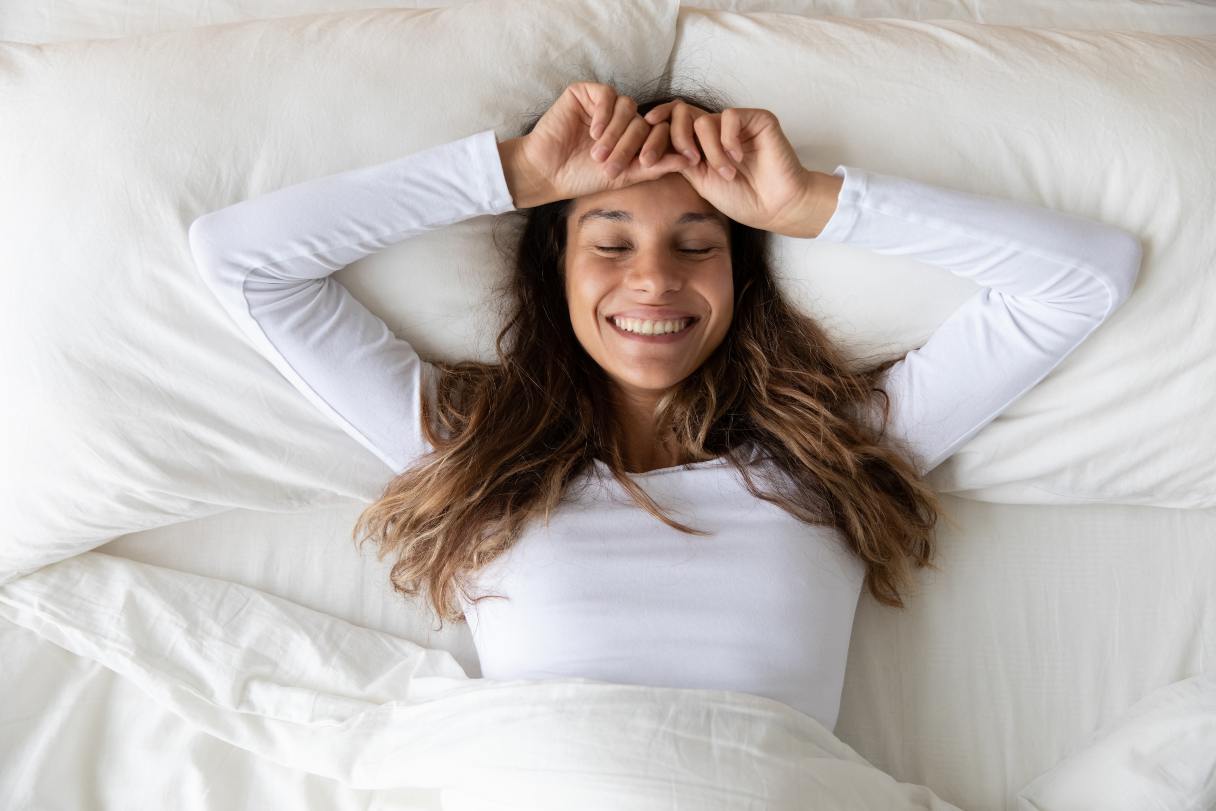Though it’s common to experience a restless night from time to time, chronic sleep deprivation can contribute to health conditions such as heart disease, weakened immunity, weight gain and concentration issues.1 Indicators of sleep deprivation include irritability, excessive sleepiness during waking hours and difficulty thinking and being logical.1
Quality sleep is vital for maintaining optimal health, allowing the body to rest, repair and restore its energy. Use the tips below to help you get a better night’s rest.
1. Exercise Daily
Regular exercise can help you fall asleep faster at bedtime, sleep better and increase your time spent in the most restorative stages of deep sleep. While vigorous exercise has its benefits, even a routine of moderate exercise like regular walking can help improve the quality of your sleep.2
Be mindful of when you exercise. Ideally, exercising in the morning or afternoon allows your body sufficient time during the day to reset its temperature, metabolism and cortisol levels post-workout. If you exercise in the evening, try to leave at least three hours between the end of your workout and bedtime.2
2. Increase Your Exposure to Natural Light
Your circadian rhythm acts like a clock and uses the naturally occurring hormone melatonin to regulate your wake/sleep cycle.3 Regular exposure to at least 30 minutes or more of sunlight or bright light during the day keeps your circadian rhythm functioning optimally.3
Try getting outside early in the day, or opening blinds or windows to take in more natural light and stimulate melatonin production. If your opportunities for natural light exposure are limited, talk to your doctor about a light therapy device.3
3. Limit Naps
For many adults, a short nap in the early afternoon can provide an energy boost for the rest of the day. But long naps lasting an hour or more, or taken late in the day, can disrupt your ability to fall asleep easily later at night. If you choose to power snooze, limit your nap time to approximately 20 minutes.3
4. Pay Attention to What You Eat
A healthy diet that includes plenty of vegetables, fruit and healthy fats is not only good for your overall health but can play a significant role in how well you’re able to sleep.2 Consuming too many refined carbohydrates, processed foods and added sugar can disrupt sleep cycles, as can spicy or acidic foods if they cause heartburn or digestive issues.2
5. Don’t Eat Too Late in the Day
Aim to finish your evening meal with enough time to leave several hours between dinner and bedtime to aid digestion. A large meal too close to bedtime can negatively affect sleep quality if you’re trying to sleep while feeling stuffed.3 Conversely, going to bed hungry might also keep you awake. If you benefit from a bedtime snack, keep it light, such as a piece of fruit, a small bowl of whole-grain cereal or yogurt.2
6. Limit Caffeine and Alcohol
Though caffeine may have its benefits, the caffeine in drinks like coffee, tea, sodas and other enhanced beverages acts as a stimulant on the nervous system and may interfere with the body’s natural relaxation process if consumed late in the day. Caffeine can remain in the bloodstream for 10 to 12 hours, making it a good idea to limit caffeine intake to support healthy sleep.2
Likewise, while alcohol acts as a depressant and can help you relax initially, a nightcap before bedtime can ultimately have the opposite effect and inhibit your ability to maintain a deep sleep.2
7. Limit Nicotine
Nicotine is a stimulant that can disrupt your ability to fall asleep and get the quality deep sleep your body needs. Avoid smoking in the evening to give your body a better chance at sleeping through the night.3
8. Create the Optimal Sleep Environment
Create a bedroom environment that’s conducive to sleep, paying attention to the temperature, sound and light. Set the room temperature between 65 degrees and 68 degrees Fahrenheit.3 Minimize distracting noise as best you can, or drown it out with a white noise machine, fan or noise-canceling earbuds or headphones. Blackout curtains or a sleep mask can help minimize exposure to natural and artificial light that could disrupt your sleep.3
9. Invest in a Comfortable Mattress and Pillow
A quality mattress and pillow can significantly improve your sleep by providing the right support and comfort, allowing the body to relax through the night.3 The right mattress and pillow will help to properly align your spine.3
Don’t overlook your bedding. Breathable sheets and blankets can help regulate your body temperature to create a more relaxing sleep environment.3
10. Save Your Bed for Sleep
Watching TV, working on a laptop or scrolling on your phone or tablet makes it harder to wind down and prepare for sleep. Saving your bed for sleep trains your brain to associate it with rest and relaxation.2 Keeping a clear boundary can help establish a healthy sleep routine and may strengthen your body’s natural sleep-wake cycle over time.
11. Manage Stress and Anxiety
Falling and staying asleep can be more difficult when your mind is racing with worries and anxiety. Practice stress management throughout the day to clear your mind and manage anxiety.
Experiment with different techniques to find what works best for you, like practicing a relaxation exercise or taking a warm bath.2
You might also try putting pen to paper and writing down your worries and problems, then set them aside.2 Taking a few moments to clear your mind or writing in a gratitude journal may also help.
12. Limit Screens Before Bed
Disconnect from smartphones, tablets, computer screens and TVs at least an hour before bedtime. Blue light from electronic devices can disrupt your sleep patterns.2
13. Practice a Wind-Down Routine
Send a signal to your body and mind that it’s time to prepare for sleep with a wind-down routine. For example, you might spend a few minutes preparing for the next morning by programming the coffee maker, setting out tomorrow’s clothes and packing your work or gym bag.
Relax your mind before bedtime with a book or by listening to soothing music. Low-impact stretching can also help you wind down.3
14. Sleep and Wake at the Same Time Every Day
Going to bed and waking up at the same time every day helps regulate your body’s internal clock, making it easier to fall asleep and wake up naturally.1 Even on weekends, sticking to a routine can help you feel more rested and balanced.2
15. Don’t Toss and Turn
If you can’t fall asleep after about 15 minutes, you may want to get out of bed and do a quiet, calming activity in low light — like reading or gentle stretching.2
Avoid screens, as the blue light can make it even harder to fall asleep.2 Once you start to feel drowsy, you may want to return to bed and try again.
Lying awake in bed may train your brain to associate your bed with restlessness, which could make falling asleep harder. Staying calm and patient can help make it easier to drift off.
16. Consider Supplements
Sleep supplements like melatonin and natural sleep aids like valerian root and chamomile can sometimes help with sleep difficulties by promoting relaxation, shortening the time it takes to fall asleep.3
Supplements are not closely regulated by the FDA, so always talk to your doctor before starting any sleep supplement, especially if you take other medications or have underlying health conditions.3
17. Sip a Home Remedy
Drinking warm milk, tart cherry juice or chamomile tea in the evening may help promote better sleep since they contain natural components like tryptophan, melatonin and flavonoids, which support relaxation and the body’s sleep‑inducing signals.4
While these home remedies might not work for everyone, a warm, non‑caffeinated bedtime drink as part of a relaxing nighttime routine may signal to your body that it’s time to wind down and rest.
18. Aim for at Least 7 Hours Each Night
Adults should get at least seven hours of sleep each night to support overall physical and mental health.5
Consistently getting less than that can lead to weakened immunity, poor concentration and mood changes.1 It can also lead to increased risk of chronic conditions like heart disease and diabetes.4
Prioritize getting enough sleep by determining your daily wake-up time, then working backwards to determine your nightly bedtime.3 Leave extra time whenever possible to prepare for bed.
Try keeping a written journal to track your sleep and look for patterns of what is working for you and what is disrupting your sleep.3
19. Consult Your Doctor
If you regularly have trouble falling or staying asleep, wake up feeling unrefreshed or feel excessively tired during the day, you may want to talk to your doctor or a sleep specialist.3
Sleep issues can sometimes be linked to underlying conditions like sleep apnea, anxiety, depression or restless leg syndrome.6 Your doctor can help identify the cause and recommend appropriate treatments or refer you to a sleep specialist if needed. Left untreated, chronic sleep deprivation can affect your heart health, immune system, mood and memory, as well as your safety and the safety of others.1
Getting medical guidance can help ensure you’re addressing the root of the problem, not just the symptoms.
Healthy Routines for Restful Sleep
Weaving together habits that prioritize your sleep environment can help set the stage for restorative rest. Pre-sleep rituals can also support a seamless transition for improved sleep. If sleep struggles persist despite adopting these habits, consulting with a healthcare provider may help you address underlying issues and regain restful, rejuvenating nights.
Managing Health and Wellness Costs With the CareCredit Credit Card
If you are looking for an option to help manage your health and wellness costs, consider financing with the CareCredit credit card. The CareCredit credit card can help you pay for the care you want and need and make payments easy to manage.* Use our Acceptance Locator to find a provider near you that accepts CareCredit. Continue your wellness journey by downloading the CareCredit Mobile App to manage your account, find a provider on the go and easily access the Well U blog for more great articles, podcasts and videos.
Your CareCredit credit card can be used in so many ways within the CareCredit network including vision, dentistry, cosmetic, pet care, hearing, health systems, dermatology, pharmacy purchases and spa treatments. How will you invest in your health and wellness next?
Author Bio
Anne-Marie Kennedy is a freelance writer with more than 20 years of experience covering health and wellness, personal finance and real estate/investing.









